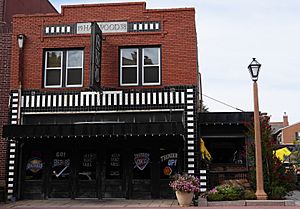Deep Deuce facts for kids
Deep Deuce is a historic neighborhood in Downtown Oklahoma City, Oklahoma. It was once a very important place for African-American culture, business, and especially jazz music. Many famous people lived or worked here, including author Ralph Ellison and musicians like Charlie Christian. Today, Deep Deuce has many new apartment buildings and shops, but it still holds a special place in Oklahoma City's history.
Located just north of Bricktown, Deep Deuce was a lively center for jazz music and African-American culture in the 1920s and 1930s. It grew to be the largest African-American neighborhood in downtown Oklahoma City by the 1940s and 1950s. Many talented musicians helped make Deep Deuce famous for its jazz. These included singer Jimmy Rushing, guitarist Charlie Christian, and bands like the Oklahoma City Blue Devils. Famous blues singers such as Ida Cox, Ma Rainey, Bessie Smith, and Mamie Smith also performed here.
After the Civil Rights Movement in the 1960s, many African-American families moved to other parts of Oklahoma City. In the 1980s, a large part of the neighborhood was cleared to build I-235. However, in recent years, downtown Oklahoma City has grown a lot, and Deep Deuce has become popular again for new development. While much of its original look has changed, its history is still remembered.
Ralph Ellison's Connection to Deep Deuce
The famous African-American writer Ralph Ellison, who wrote the important book Invisible Man, grew up in the Deep Deuce area. He often wrote about the neighborhood in his works. In 1953, he wrote a poem called "Deep Second" as a tribute to the area. This poem shows how much he loved Deep Deuce, which was also where he had his first job. You can find this poem in his book Trading Twelves.
Aldridge Theater: A Historic Stage
The Aldridge Theater was a very important place in Deep Deuce. It was built in 1920 and was the first theater in Oklahoma City specifically for African Americans. The theater showed both vaudeville acts (live stage shows with different kinds of entertainment) and movies. It was part of the TOBA chain, which was a network of theaters owned by African Americans. Famous musicians like Count Basie played here. From the 1940s onward, it mainly operated as a movie theater.
 | William L. Dawson |
 | W. E. B. Du Bois |
 | Harry Belafonte |


